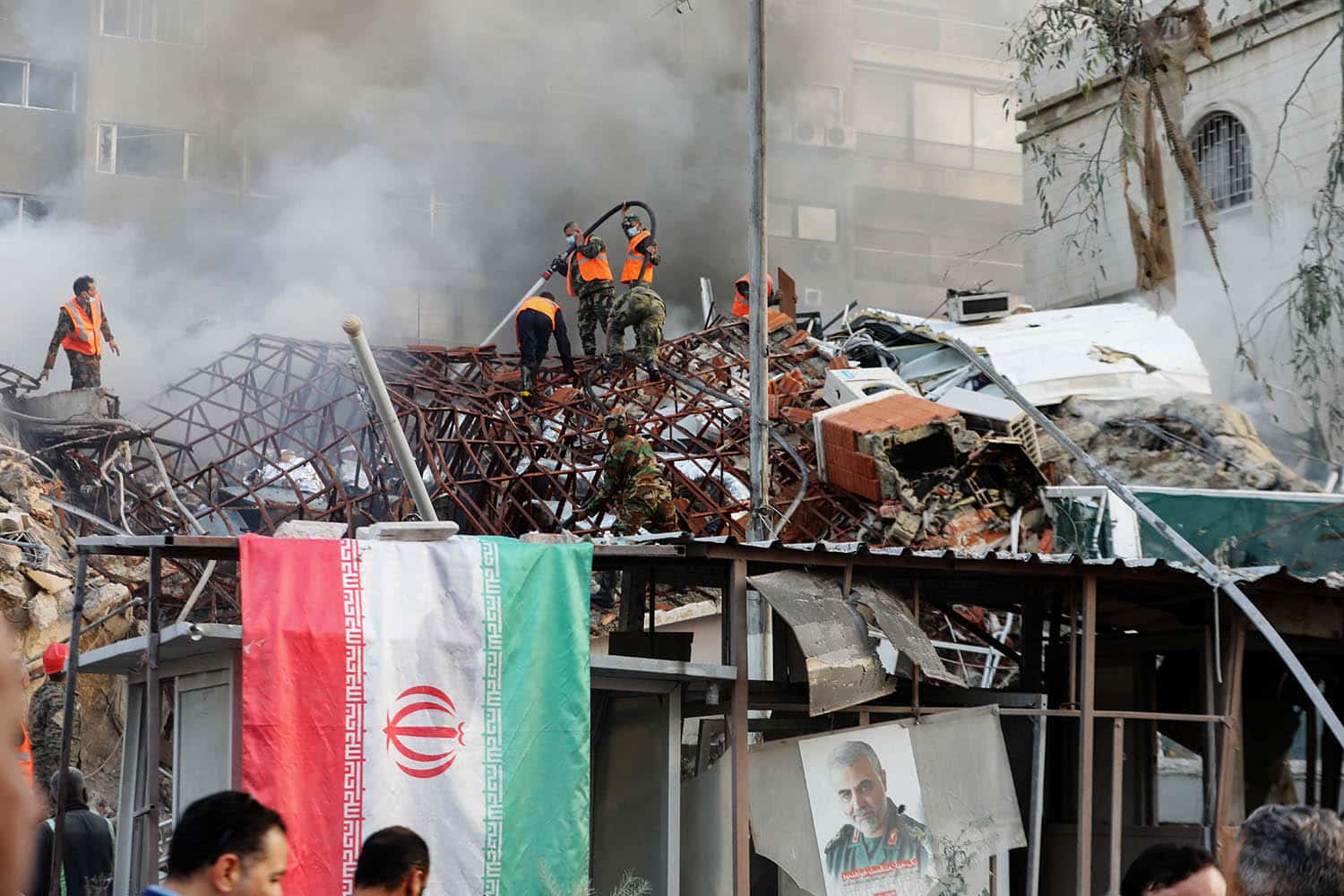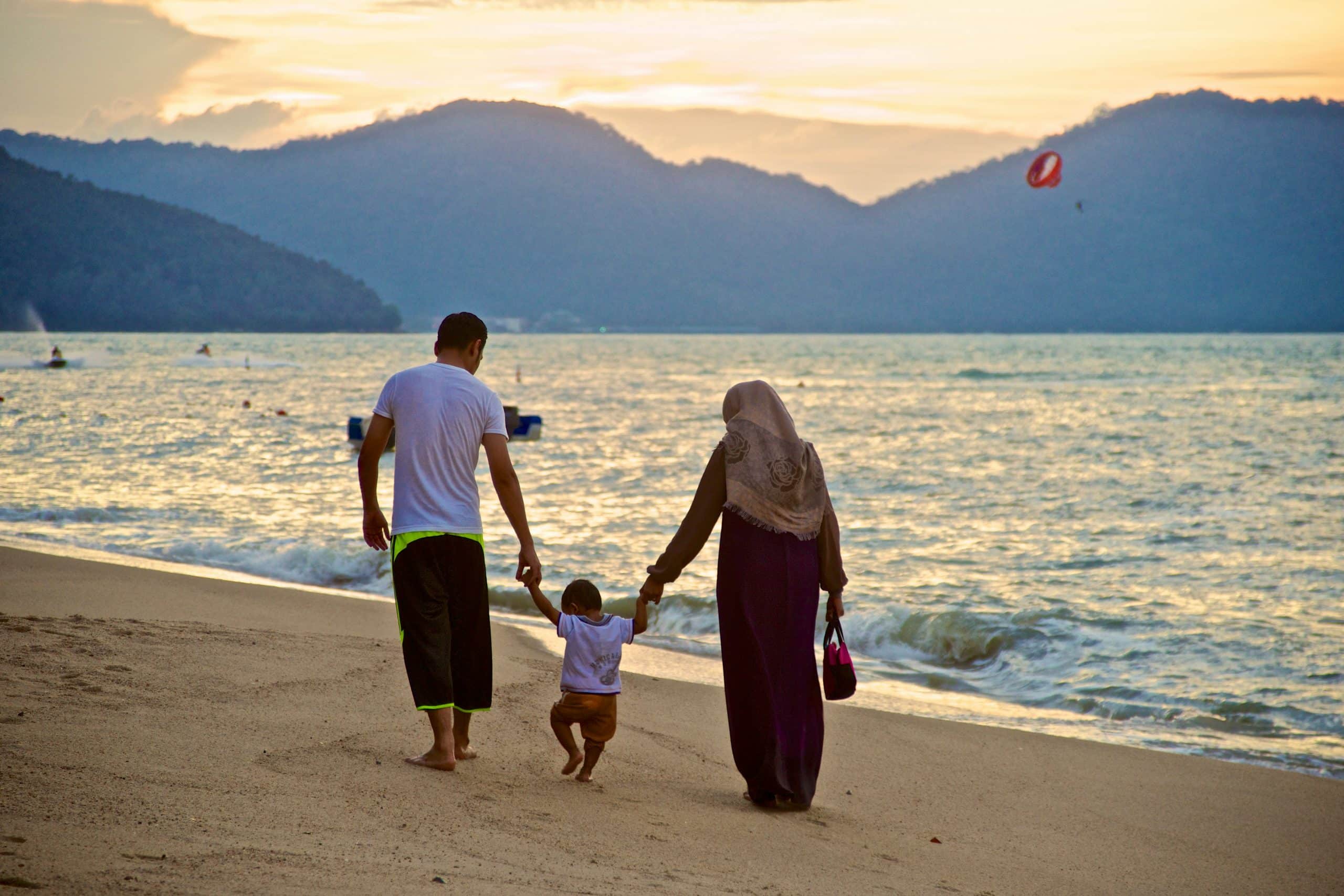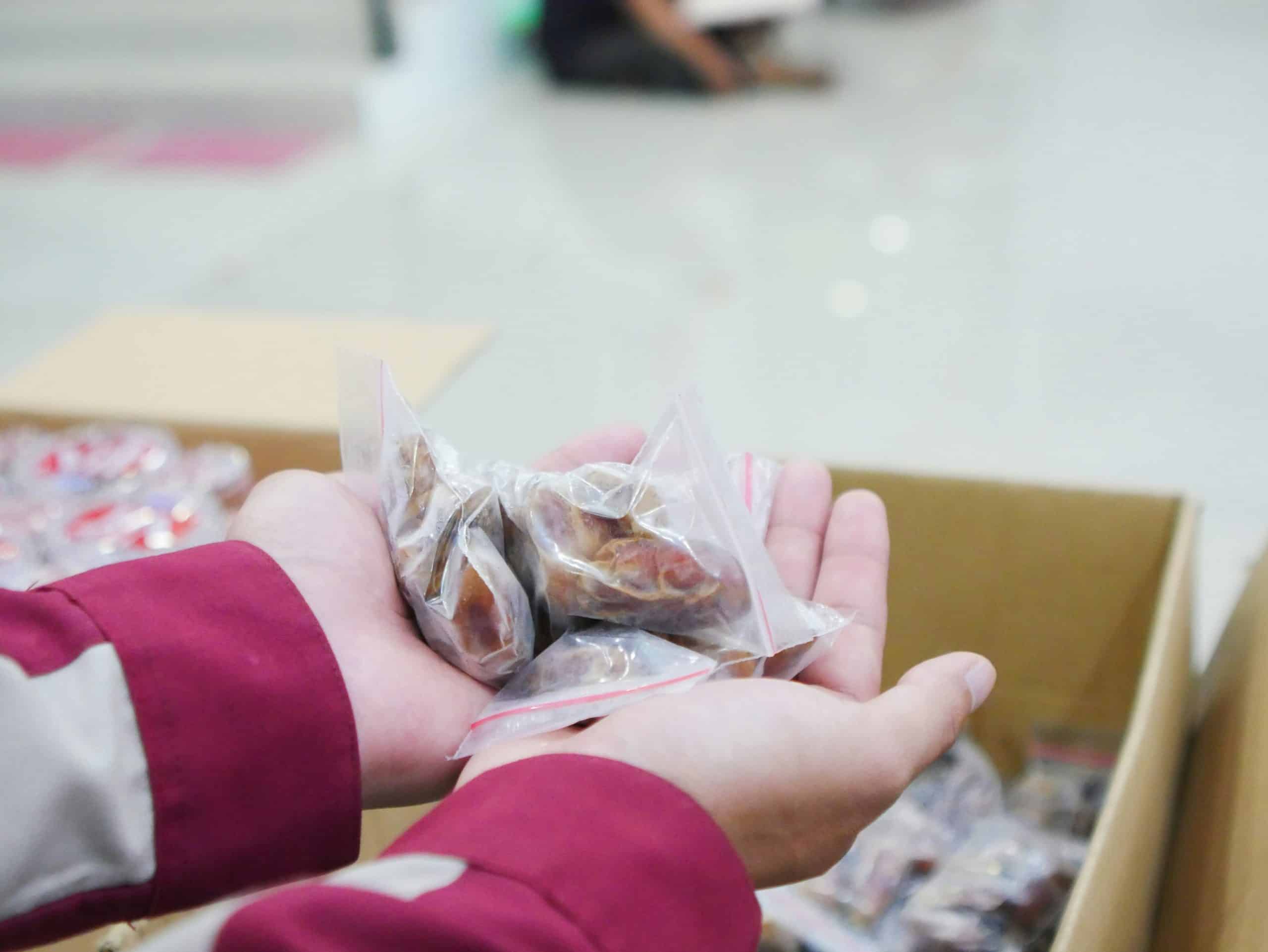Israel Seeks Escalation For Latitude – The Regional “Conflict” Widens
by Ibrahim Moiz for MuslimMatters
18 April 2024
It comes as no surprise that the breathless prospect of a war between Iran and Israel, the feuding regional expansionists of southwest Asia, has again drenched the headlines. When Israel bombarded the Iranian embassy in Damascus earlier this month, it deliberately sought to widen the scope of conflict in the region in order to raise the stakes and draw the United States more directly into the fray. In so doing, it also took temporary attention off its own genocidal assault on the Palestinians in Gaza. Iran, meanwhile, has staked its regional reputation as an emblem of “resistance” to the Zionist state and the United States, and felt compelled to respond, if only to maintain that credibility and ensure that further Israeli attacks would not go without question.
BackgroundThis writer has for fifteen years been hearing breathless talk of an American war on Iran. The coming to power of Mahmoud Ahmadinejad in 2005, his government’s crackdown on a defeated opposition after the 2009 election, major protests in Iran in 2017 and 2022, and certain flashpoints in the Iraqi and Syrian wars each brought grim warnings of an impending war with Iran. When in 2003 former American generallissimo for Europe, Wesley Clark, ran for the American presidency, he listed Iran among the seven countries targeted by the then-neoconservative regime in Washington D.C. Even earlier in 2002, Iran was listed by the United States in an improbable alliance with its archenemy Iraq as well as North Korea – a late stand-in for Tehran’s ally Syria, even as Damascus worked behind the scenes with American repression – as part of an “Axis of Evil”. In turn, Tehran defiantly positioned itself at the center of an “Axis of Resistance”, purporting to remove the American shadow from the Middle East and attack Israel.
Tehran’s actual record, however, is far more mixed than this chest-thumping rhetoric would suggest. To be sure, the United States has an unusual obsession with Iran dating back to the 1950s, when they famously engineered a coup against a nationalist government in favor of a tyrannical monarchy. That monarchy’s overthrow in the 1979 Iranian revolution was accompanied by rousing rhetoric about defeating the Great Satan and spreading an Islamic Revolution; since then, Tehran has been a target of both American sanctions and rhetoric, coupled with occasional back-and-forth attacks such as the 1983 attack on the American barracks at Baghdad and 1987-88 attacks on Iranian seacraft. The most dramatic recent episode saw the American assassination of Iranian generalissimo Ghassem Soleimani, a major architect of Iran’s regional network, after his militias had menaced the hulking, fort-like American embassy in Baghdad.

Escalation in regional conflict after Israel bombs Iranian embassy in Damascus (Photo by LOUAI BESHARA/AFP via Getty Images)
A closer look, however, reveals that mutual obsession is precisely a reason that Washington and Tehran’s spars have not escalated into full-blown war. For instance, during much of the 1980s Gulf war the United States formally backed Saddam Hussein’s Iraq, in a nod to their Gulf allies, but informally also armed Iran in a nod, ironically, to its closest ally Israel, which saw Baghdad as a worse prospect than Tehran. At the outset of the American war in the Muslim world, Iranian troops helped invade Afghanistan – where, indeed, the coalition of opposition to the Taliban was originally gathered by Tehran – and, even after being denounced in an “Axis of Evil”, helped invade neighboring Iraq by dispatching their local vassals in league with the Americans. The latter was a serious risk, given that American occupations now flanked Iran to east and west, but the pay-off was that the American-installed regime in Baghdad proved eminently friendly to Tehran, who frequently played off different Iraqi groups to maintain their supremacy.
Neocon bloodlust aside, this role was eventually realized in Washington: thus, for instance, it welcomed the Iranian-backed Hezbollah entering formal Lebanese politics in 2005, and after largely empty early threats against Bashar Assad – for whose protection Iran invaded Syria during its civil war – the United States backed out, instead preferring to target the Daesh group that had formed after the Iraq invasion. In the latter war, Soleimani’s web of Shia militias proved valuable: while the Americans bombarded Daesh from the air, Iranian troops and militias attacked them on the ground. This occurred after the 2015 Geneva Accord had been reached with Tehran over their nuclear programme, where Iran’s role in Syria was a major bargaining tool. Though Donald Trump’s regime promptly scrapped the agreement and briefly escalated tensions with Iran, it has long been abundantly clear that Tehran, through a skillful mixture of quiet cooperation interspersed with occasional escalation, has enough mutual interest in countries like Iraq to avert a direct attack by the United States. In turn, Washington, no love though they might have for Tehran, has little interest in a large-scale war that could potentially dwarf its misadventures in Afghanistan and Iraq.
Where Iranian expansionism has been indirectly useful for Washington has been in persuading Arab regimes that Tehran and not Tel Aviv is their ultimate enemy. This, in turn, has paved the way for normalization between the Zionist ethnostate and various mainly despotic Arab governments under American brokerage, in the ludicrously misnamed “Abraham Accords” of the early 2020s – in combining Jewish ethnonationalists and Arab despots, the deals would have been better named Herod Accords. Iran’s benefit has been to continue to expand its influence – in Iraq, Syria, Lebanon, and even to some extent Yemen – westwards, a project that predated the 1979 revolution.
Escalation to Get LeewayUnlike in the 1980s, Israel now sees Iran as its premier, potentially nuclear, rival in the region. Escalation with Iran, Tel Aviv knows, would inevitably drag in the United States to its own rescue, and force them into a frontal confrontation with Tehran; moreover, it would be welcomed, whether openly or tacitly, by many Arab rulers from Jordan to Saudi Arabia: they are genuinely frightened of Iran, whose contempt toward them has been undisguised since the 1979 revolution. For its anti-American rhetoric and occasional actions, Tehran’s most frequent and bitter target of opposition has been what it views as the petty puppet states of the Arabian Peninsula, particularly Saudi Arabia. At least since 2015, this has translated into backroom links between various Arab rulers and Israel.
This is the reason that Benjamin Netanyahu has repeatedly called in public on Arab statesmen to hold their silence on his genocide, attempting to portray Palestinian resistance as an Iranian puppet. In fact, of course, Palestinian resistance is organic and has lasted generations, no more a puppet of Tehran now than it was a puppet of Cairo in the 1960s or Tripoli in the 1970s. Modest Iranian armament of the Palestinians has not disguised the latter’s independence – Hamas, for instance, broke with Tehran for years over the Syrian war, where they backed different sides, and continues to maintain cordial diplomatic links with other governments such as Cairo and Amman to keep its options open.
The fact that it has nonetheless been primarily Iran-linked groups outside Palestine that have made any meaningful contribution against Israel, with the Lebanese Hezbollah striking in the north and the Yemeni Houthis in the Red Sea, has given Tel Aviv the opportunity to present the frustratingly resilient Palestinian resistance as a Persian proxy and probe Iran into an escalation to turn this propaganda into reality. Already since the winter Israel had struck in Lebanon and Syria, killing not only Hamas leader Saleh Arouri and his lieutenants but also Hezbollah officers and senior Iranian generals Razi Mousavi, Sadegh Omidzadeh, and the former commander of both the Iranian praetorian ground and air forces, Reza Zahedi. The latter was slain in the April 2024 attack on the Iranian embassy in Damascus, officially an act of war.
Iran felt compelled to respond, if only to draw a line, but also feared drawing the United States into the fray. Thus its retaliatory strike on Israel was carefully choreographed and allegedly warned beforehand, with its United Nations envoy Amir Iravani stressing afterward that it sought no more escalation: Tehran’s point had been made, and “the matter can be deemed concluded.” Whatever the mental gymnastics of Zionist politicians and media, this was a predictable, eminently rational response, and even a rabidly pro-Israel United States is not willing to stick its neck out beyond indignant verbiage.
What the Iranian-Israeli duel has done, however, is enable Israel to get another concession. The increasingly feeble government of Robinette Biden has been apprehensive about an Israeli attack on the southern Gazan city of Rafah, near the border where some million Palestinian refugees have been driven to the discomfort of both otherwise pro-Israel governments in Cairo and Washington. Having been unable to respond to Iran on Israel’s behalf, Biden will likely yield to Netanyahu’s festering thirst to attack Rafah. In that respect, the real victims of this latest round of Iran-Israel irascibility are likely to be the Palestinians.
Related:
– Foreign Affairs Official Resigns Over Gaza Genocide
The post Israel Seeks Escalation For Latitude – The Regional “Conflict” Widens appeared first on MuslimMatters.org.

 said:
said: reward all our foremothers for their strength! Inspired by my mother’s example, I was determined not to add to my qada fasts with my subsequent pregnancies.
reward all our foremothers for their strength! Inspired by my mother’s example, I was determined not to add to my qada fasts with my subsequent pregnancies.  “Or who is it that could provide for you if He withheld His provision? But they have persisted in insolence and aversion.” [Surah Al Mulk: 67;21]
“Or who is it that could provide for you if He withheld His provision? But they have persisted in insolence and aversion.” [Surah Al Mulk: 67;21]
 :
: